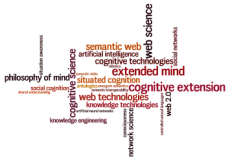Research Interests
Cognition and the Web
My main area of research interest relates to the cognitive and epistemic impacts of Web technology. I am particularly interested in issues that lie at the intersection of Web Science, cognitive science and the philosophy of mind. One of the main issues I have sought to address relates to whether the features of current and near-future Web-enabled devices are able to support the emergence of Web-based forms of cognitive extension. This is an issue that emerges from recent debates in the philosophy of mind concerning the notion of active externalism. I have argued that we should adopt an ecological approach to the Web, recognizing the Web as an important aspect of the cognitive ecology in which a variety of cognitive systems may emerge. In contrast to the usual focus in cognitive science and the philosophy of mind, I have argued that issues of cognitive extension enable us to see how the Web provides opportunities for the realization of novel forms of machine intelligence, especially ones in which human agents serve as part of the physical fabric underlying machine-based cognitive processes.
| Key Concepts |
|
Predictive Processing
An emerging consensus in cognitive science views the biological brain as a hierarchically-organized predictive processing system. This is a system in which higher-order regions are continuously attempting to predict the activity of lower-order regions at a variety of (increasingly abstract) spatial and temporal scales. The brain is thus revealed as a hierarchical prediction machine that is constantly engaged in the attempt to predict the flow of information originating from the sensory surfaces. Such a view seems to afford a great deal of explanatory leverage when it comes to a broad swathe of seemingly disparate psychological phenomena (e.g., learning, memory, perception, action, emotion, planning, reasoning, imagination, and conscious experience). In the most positive case, the predictive processing story seems to provide our first glimpse as to what a unified (computationally-tractable and neurobiologically plausible) account of human psychology might look like. This obviously marks out one reason why predictive processing models deserve to be the focus of current empirical and theoretical attention. Another reason, however, is rooted in the potential of such models to advance the current state-of-the-art in machine intelligence and machine learning. Interestingly, the vision of the brain as a hierarchical prediction machine is one that establishes contact with work that goes under the heading of 'deep learning'. Deep learning systems thus often attempt to make use of predictive processing schemes and (increasingly abstract) generative models as a means of supporting the analysis of large data sets. But are such computational systems sufficient (by themselves) to provide a route to general human-level intelligence? I suggest that they are not and that closer attention to a broader range of forces and factors (many of which are not confined to the neural realm) may be required to understand what it is that gives human cognition its distinct (and largely unique) flavour. The vision that emerges is one of 'homomimetic deep learning systems', systems that situate a hierarchically-organized predictive processing core within a larger nexus of developmental, behavioural, symbolic, technological and social influences. Relative to that vision, I suggest that predictive processing accounts provide a conceptual springboard for a range of novel ideas relating to digital immortality, machine consciousness, and the 'minding' of social activities and social processes.
| Key Concepts |
|
Collective Cognition
What are the factors that determine the collective performance of groups engaged in collective tasks? This question lies at the heart of a broad array of research endeavours that straddle the disciplines of social psychology, network science, and cognitive systems engineering. My approach to this question is grounded in the use of cognitive architectures and multi-agent computer simulations. I rely on the use of cognitive modelling techniques to develop computational models of individual agent cognition. I then study the relationship between agent interaction and collective performance outcomes. This approach to simulating the performance of collective cognitive systems sometimes goes under the heading of cognitive social simulation.
| Key Concepts |
|
Cognition in the Virtual World
This area of research subsumes two major topics of interest. Firstly, I am interested in the use of virtual environments for the purposes of performing computer simulations of embodied, extended, enactive and embedded cognitive processes. By making use of contemporary game engines and 3D modelling techniques, I suggest that we can use computer simulation techniques to study the way in which intelligent behaviour emerges from processing loops that extend across the brain, the body and the world. A second focus of interest relates to the cognitive impact of virtual and augmented reality technology. I have suggested that augmented reality technologies enable us to rapidly design 'effective' environments that shape, scaffold and support our cognitive profiles. I have also sought to understand the implications of holographic computing devices for notions of cognitive extension.
| Key Concepts |
|
Computational Epistemology
Computational epistemology is a branch of contemporary epistemology that relies on the use of computational techniques to answer questions of major epistemological significance. One area of computational epistemology focuses on the use of knowledge engineering techniques to develop machine-readable representations of epistemological concepts. These machine-readable resources can be subjected to forms of automated analysis and reasoning that seek to further our understanding of the nature, function and value of epistemological concepts. A second branch of computational epistemology focuses on the veritistic value of social practices, structures and organizations with respect to the generation of collective knowledge. Computer simulation techniques are often used to evaluate different forms of socio-epistemic system, although empirical observation using digital cognitive ethnographic and socioscopic techniques are also important. A third branch of computational epistemology focuses on the nature of our interaction with technological devices and systems. The aim, here, is to understand the extent to which technological systems can work to enhance the epistemic standing of both human and machine agents.
| Key Concepts |
|

